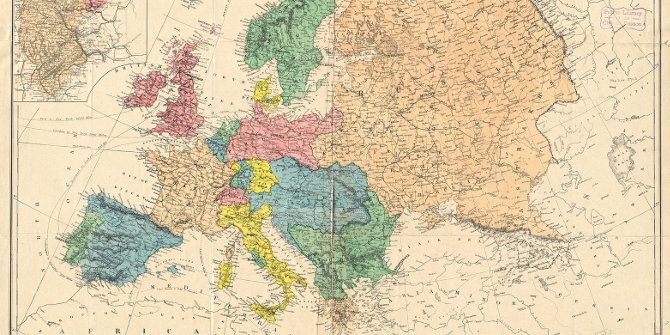Denmark has implemented legislation which effectively limits the percentage of ‘non-western’ residents living in particular housing areas. Hans Skifter Andersen writes that while the legislation has been proposed as a way to prevent the emergence of parallel societies within Denmark, it runs contrary to existing research on social segregation.
In 2017 a majority in the Danish parliament passed a declaration stating that ‘It is the opinion of the Parliament that Danes should not be a minority in any housing area’. A year later, new legislation, often referred to as the ‘ghetto law’, was passed. It contained a range of interventions in social housing areas with a high proportion of ethnic minorities originating from so-called non-western countries.
The most significant intervention was a general rule stating that the proportion of social dwellings, intended for families, should be reduced to only 40% of the dwellings in the area. This should be obtained by a combination of demolition, new building and sale of dwellings to private investors. Moreover, the legislation prohibited people who were not in employment from moving into these neighbourhoods. The purpose was to replace the present ethnic minorities in these neighbourhoods with Danes and people in employment.
In the first round, 16 estates with 46,000 residents were chosen based on statistics on their ethnic and social composition, but further estates can be chosen in the future if they match the statistical criteria defined for being a ‘ghetto’. Another group of estates was identified as deprived housing. In these estates, which include around 120,000 dwellings, a change of the waiting list system will give preference to people in employment or education. Local authorities are also no longer allowed to allocate homeless people to these dwellings.
Overall, some 12 per cent of all social dwellings are now subject to these rules. Recently, Denmark’s Housing Minister proposed extending these rules to all estates where more than 30 per cent of the population are ethnic minorities. This would be a problem in the municipality of Copenhagen where more than 30 per cent of all residents in social housing are ethnic minorities.
Social consequences
The implementation of the ‘ghetto law’ will result in a reduction of social housing and especially housing with moderate rent prices. It will moreover restrict the housing options for ethnic minorities and people who are either unemployed or on low incomes. As yet, there has been no serious attempt made to counter this impact on the supply of housing for some of the most vulnerable groups in society.
The most important criterion in the selection of a ‘ghetto’ is that the proportion of residents who are immigrants or descendants of immigrants from ‘non-western countries’ should not exceed 50 per cent. There is no distinction between Danish citizens and non-citizens. This approach has been accused of violating international conventions against racism, and some of the residents who face being expelled from their homes have initiated legal action against the government.
In the political debate, and in the written justification of the law, a key argument has been that the concentration of ethnic minorities in some neighbourhoods is a result of their propensity to move together to form ‘parallel societies’. Indeed, the law is often framed as an attempt to ‘fight against parallel societies’. Denmark is, however, one of the countries in Europe with the least ethnic segregation, as I have shown in my book ‘Ethnic Spatial Segregation in European Cities’. Denmark also has fewer problems in deprived housing areas than many other countries and social housing is in general very well maintained. The residents are just as satisfied with their physical environment as in other social housing areas, but some complain about social problems.
The arguments surrounding parallel societies run contrary to what is known from research in Denmark and other countries, as demonstrated in my own work. Segregation of ethnic minorities is connected to social segregation, but there is strong evidence that a major factor is the behaviour of the ethnic majority, who deselect neighbourhoods with ethnic minorities. Moreover, ethnic minorities often have difficulty gaining access to housing other than social housing, especially private renting. In most of the housing areas affected by the ghetto law there is a very diverse population consisting of residents coming from many different countries with weak mutual relationships. The areas are quite unstable with a constant turnover of residents. It has been shown that these estates have often been used by new immigrants, who move out again once they get better jobs. Those who remain are often people with social problems.
Finally, one might wonder why a country like Denmark has introduced a housing policy that has such harsh implications for poor people and ethnic minorities. The answer lies in in the political situation in Denmark, particularly the loss of support the Social Democrats have experienced in recent years to the Danish People’s Party, which was founded in part as a protest against immigration. This has ensured that one of the most important elements in Danish politics is the extent to which parties can attract voters who are against immigration. In this contest, the ‘fight against parallel societies’ continues to have high symbolic value.
Note: This article gives the views of the author, not the position of EUROPP – European Politics and Policy or the London School of Economics. Featured image credit: Jonas Smith on Unsplash





